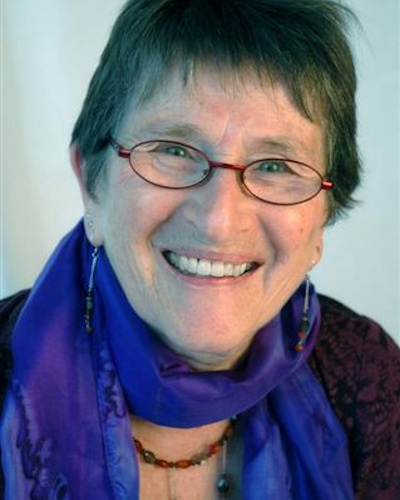
Dr. Evelyn "Evi" Torton Beck Oral History
Part 1:
Part 2:
Part 3:
→ Transcript of Evelyn "Evi" Torton Beck’s interview.
Biography
Evelyn “Evi” Torton Beck, Women’s Studies and Jewish Studies Professor Emerita at the University of Maryland, holds Ph.D.s in both Comparative Literature (University of Wisconsin, 1969) and Clinical Psychology (The Fielding Graduate University, 2002). She is best known in the LGBTQ community for her ground-breaking, now classic book, Nice Jewish Girls: A Lesbian Anthology (Persephone Press, 1982; Crossing Press, 1984; revised and expanded edition, Beacon Press, 1987).
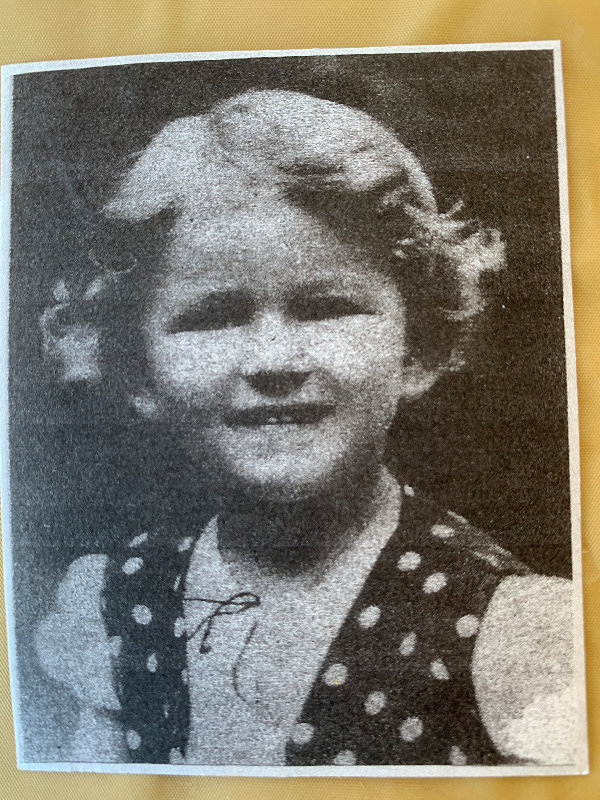 Evi as a happy 5 year old, shortly before Hitler annexed Vienna, Austria. 1938.Through poetry, essays, photographs and short stories, this anthology was the first of its kind to give voice to previously invisible women from the U.S. and abroad who identified as both Jewish and lesbian. At the first public reading from this anthology in Boston, Beck was publicly “excommunicated” from Judaism by a group of ultra-Orthodox Jewish men who picketed the event. Although this episode shocked Beck, it did not deter her from working to eradicate homophobia within Jewish communities and anti-Semitism within lesbian groups. For more than a decade, Beck was an active member of B’not Esh (Sisters of Fire), a group of rabbis, therapists, theologians, therapists and scholars dedicated to creating theory, activism and ritual from a Jewish feminist perspective. She was also a founding member of the ironically titled Di Vilde Chayes (The Wild Beasts, en epithet applied to uppity women), a Jewish lesbian feminist group which addressed political issues raised by Nice Jewish Girls. In the mid 1980s this anthology spawned many such groups and served as an organizing tool in creating diverse Jewish lesbian communities in the USA, Europe, and Israel.
Evi as a happy 5 year old, shortly before Hitler annexed Vienna, Austria. 1938.Through poetry, essays, photographs and short stories, this anthology was the first of its kind to give voice to previously invisible women from the U.S. and abroad who identified as both Jewish and lesbian. At the first public reading from this anthology in Boston, Beck was publicly “excommunicated” from Judaism by a group of ultra-Orthodox Jewish men who picketed the event. Although this episode shocked Beck, it did not deter her from working to eradicate homophobia within Jewish communities and anti-Semitism within lesbian groups. For more than a decade, Beck was an active member of B’not Esh (Sisters of Fire), a group of rabbis, therapists, theologians, therapists and scholars dedicated to creating theory, activism and ritual from a Jewish feminist perspective. She was also a founding member of the ironically titled Di Vilde Chayes (The Wild Beasts, en epithet applied to uppity women), a Jewish lesbian feminist group which addressed political issues raised by Nice Jewish Girls. In the mid 1980s this anthology spawned many such groups and served as an organizing tool in creating diverse Jewish lesbian communities in the USA, Europe, and Israel.
Beck was a founding member of the National Women’s Studies Association and lobbied hard to create its Jewish and Lesbian caucuses, both of which have continued to flourish. She was a pioneer in developing Jewish Women’s Studies and Lesbian Studies with attention to the intersection of these and other “spoiled” identities. Early in her academic career, her activism led her to make Yiddish language and literature a legitimate focus of research within the Modern Language Association.
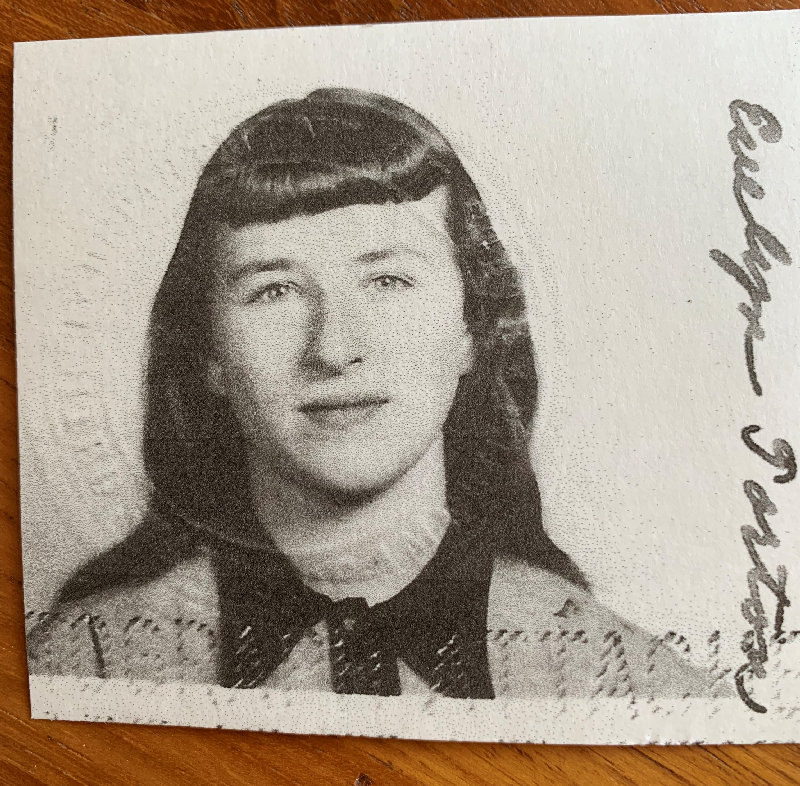 Evi’s first USA passport picture. Age 18.At the University of Maryland she was instrumental in making the campus more hospitable to LBGTQ students, faculty and staff, and was honored as the Outstanding Woman of the Year in 1994; in 1995 received the Distinguished Scholar/Teacher Award. Although she identifies as a Jewish secular activist, for many years Beck was a member of Washington DC’s LGBTQ synagogue, Beth Mishpacha; in 1999 she received their Harvey Milk Chesed Award for “loving service to the Bet Mishpachah community and the Greater GLBT Community.”
Evi’s first USA passport picture. Age 18.At the University of Maryland she was instrumental in making the campus more hospitable to LBGTQ students, faculty and staff, and was honored as the Outstanding Woman of the Year in 1994; in 1995 received the Distinguished Scholar/Teacher Award. Although she identifies as a Jewish secular activist, for many years Beck was a member of Washington DC’s LGBTQ synagogue, Beth Mishpacha; in 1999 she received their Harvey Milk Chesed Award for “loving service to the Bet Mishpachah community and the Greater GLBT Community.”
Beck is included in the encyclopedia Jewish Women in America (eds. Hyman & Moore) and serves on the advisory editorial board of Bridges: A Jewish Feminist Journal. She is a frequent contributor to Lilith: Independent, Jewish & Frankly Feminist. Her essay on “Jewish Lesbians” appears in the Reader’s Companion to U.S. Women’s History (ed. W. Mankiller, et al). She documented her experiences as an out Jewish/Lesbian director of Women’s Studies at a large state university in Tilting the Tower: Lesbians Teaching Queer Subjects (ed. L. Garber).
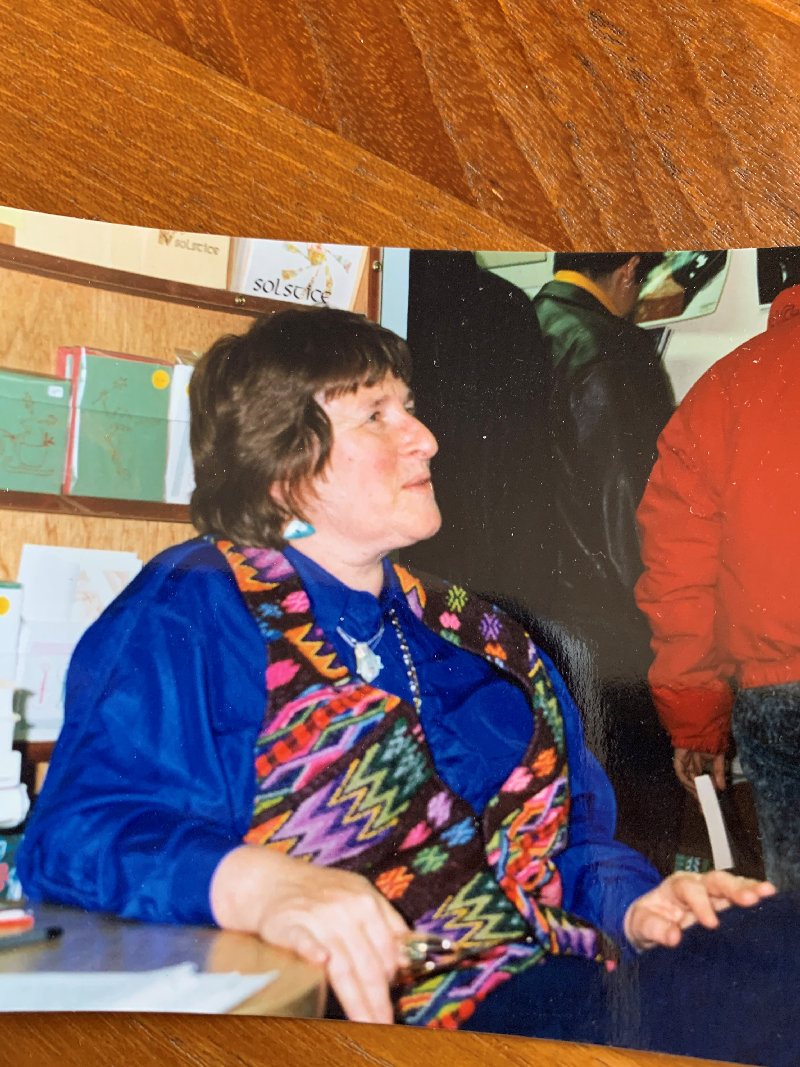 Evi after reading from Nice Jewish Girls A Lesbian Anthology at Lammas feminist bookstore in Washington DC 1995.Beck’s earliest scholarly book, Kafka and the Yiddish Theater: Its Impact on His Work, (1971) brought attention to the significance of Jewish identity in Franz Kafka’s writings. Her later research brought to light the deeply homoerotic imagery that permeates his fiction and personal writings that reveal his struggle to live a straight life in a homophobic world. She reflected on her continuing interest in Kafka in “Why Kafka? A Jewish Lesbian Feminist Asks Herself?” Her writings also include studies of Frida Kahlo’s bisexual identity, childhood sexual abuse, and Jewish identity that appear in the symbolic imagery of her paintings. Beck also worked closely with Isaac Bashevis Singer, whose stories she translated from the Yiddish. She worked to bring Jewish identity into multicultural studies and Jewish material into the teaching of psychology. She has lectured on sexism, racism, anti-Semitism and homophobia in Europe, Japan, and across the United States. Interviews with her appear in English, German and Japanese journals. She was invited to offer a feminist critique of Freud’s legacy on the Diane Rhiem show and was heard on NPR with a critique of the epithet, “Jewish American Princess” which she believed was the result of anti-Semitism and sexism directed at Jewish women.
Evi after reading from Nice Jewish Girls A Lesbian Anthology at Lammas feminist bookstore in Washington DC 1995.Beck’s earliest scholarly book, Kafka and the Yiddish Theater: Its Impact on His Work, (1971) brought attention to the significance of Jewish identity in Franz Kafka’s writings. Her later research brought to light the deeply homoerotic imagery that permeates his fiction and personal writings that reveal his struggle to live a straight life in a homophobic world. She reflected on her continuing interest in Kafka in “Why Kafka? A Jewish Lesbian Feminist Asks Herself?” Her writings also include studies of Frida Kahlo’s bisexual identity, childhood sexual abuse, and Jewish identity that appear in the symbolic imagery of her paintings. Beck also worked closely with Isaac Bashevis Singer, whose stories she translated from the Yiddish. She worked to bring Jewish identity into multicultural studies and Jewish material into the teaching of psychology. She has lectured on sexism, racism, anti-Semitism and homophobia in Europe, Japan, and across the United States. Interviews with her appear in English, German and Japanese journals. She was invited to offer a feminist critique of Freud’s legacy on the Diane Rhiem show and was heard on NPR with a critique of the epithet, “Jewish American Princess” which she believed was the result of anti-Semitism and sexism directed at Jewish women.
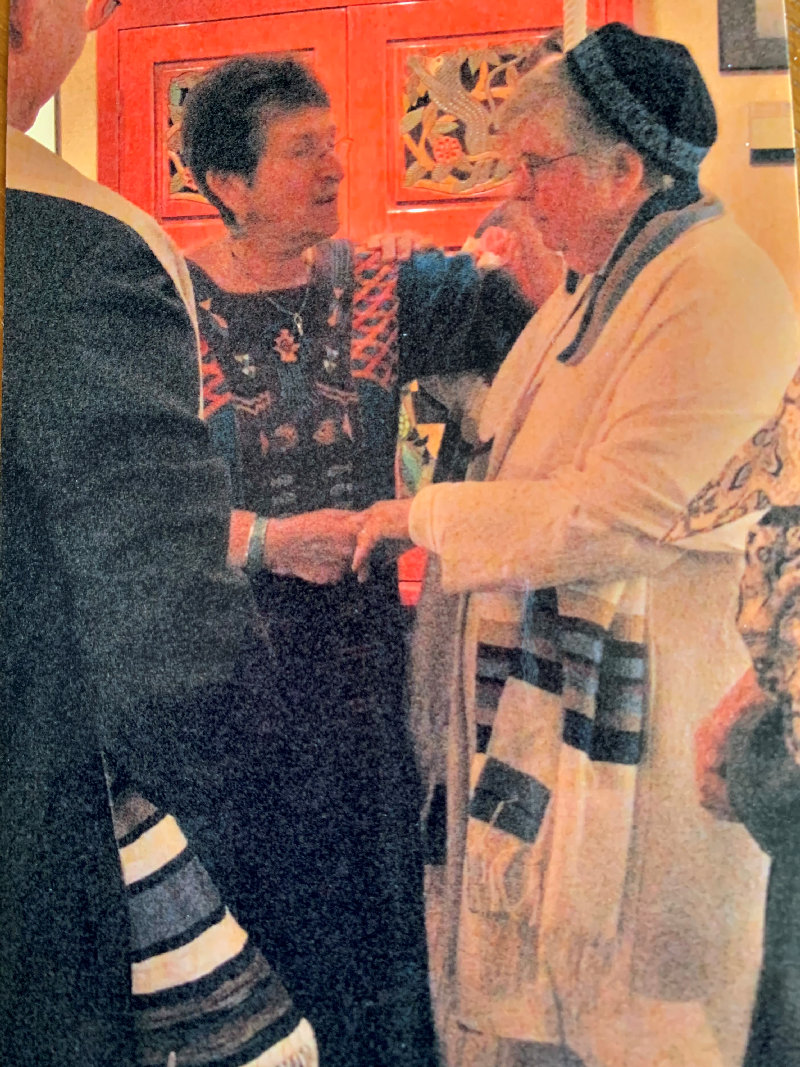 Evi marrying her decades long partner, Lee Knefelkamp, in their home Washington DC, shortly after same sex marriage was declared legal. March 16, 2010.Beck is an Alum Research Fellow with the Creative Longevity and Wisdom Initiative at the Fielding Graduate University where she researched women’s ways of aging creatively by interviewing older women who participated in the Sacred Circle Dancing, which she herself has been teaching for two decades. She has offered workshops on themes like “Integrating Life’s Journey “ and “Health and Healing” through poetry, dance and art, to which she brought her training as a psychotherapist. She still teaches intermittently at Fielding, as well as the Wise Aging program at Temple Micah in Washington D.C. She is currently enrolled in a program which trains participants in coaching from a somatic and phenomenological perspective. She continues to enjoy dancing, and includes it as an aspect of her ongoing integrative arts work, which combines dance with painting and writing.
Evi marrying her decades long partner, Lee Knefelkamp, in their home Washington DC, shortly after same sex marriage was declared legal. March 16, 2010.Beck is an Alum Research Fellow with the Creative Longevity and Wisdom Initiative at the Fielding Graduate University where she researched women’s ways of aging creatively by interviewing older women who participated in the Sacred Circle Dancing, which she herself has been teaching for two decades. She has offered workshops on themes like “Integrating Life’s Journey “ and “Health and Healing” through poetry, dance and art, to which she brought her training as a psychotherapist. She still teaches intermittently at Fielding, as well as the Wise Aging program at Temple Micah in Washington D.C. She is currently enrolled in a program which trains participants in coaching from a somatic and phenomenological perspective. She continues to enjoy dancing, and includes it as an aspect of her ongoing integrative arts work, which combines dance with painting and writing.
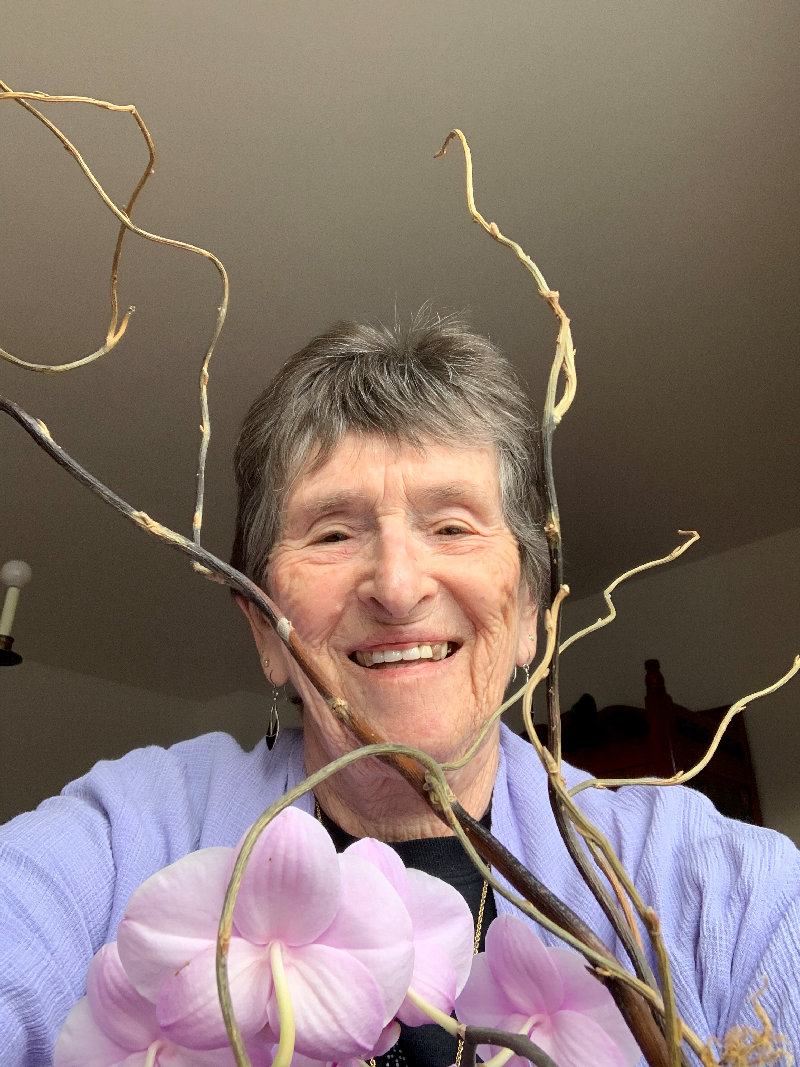 Evi in 2020. Age 87.Born in 1933, Beck is a child survivor of the Holocaust; her father was arrested in 1938 on Kristallnacht and sent to the concentration camps of Buchenwald and Dachau, where he was imprisoned and tortured for a year, before he was miraculously released. In late 1939, her small nuclear family escaped to Italy, but her beloved grandmother and others in the family were murdered in Auschwitz. In June of 1940, on the last boat to leave Italy, she arrived in New York City, where she lived until she finished Brooklyn College. In 1954, just out of college, she married Anatole Beck with whom she had two children, Nina Rachel Beck (who was a plaintiff in the successful suit for civil unions in the state of Vermont) and Micah Daniel Beck, through which she now has both grandchildren and great-grandchildren. At the age of 40 she came out as a lesbian. In 2010 she married her spouse L. Lee Knefelkamp, an LGBTQ activist also in the field of higher education, who passed away in 2018. She lives in Washington, D.C.
Evi in 2020. Age 87.Born in 1933, Beck is a child survivor of the Holocaust; her father was arrested in 1938 on Kristallnacht and sent to the concentration camps of Buchenwald and Dachau, where he was imprisoned and tortured for a year, before he was miraculously released. In late 1939, her small nuclear family escaped to Italy, but her beloved grandmother and others in the family were murdered in Auschwitz. In June of 1940, on the last boat to leave Italy, she arrived in New York City, where she lived until she finished Brooklyn College. In 1954, just out of college, she married Anatole Beck with whom she had two children, Nina Rachel Beck (who was a plaintiff in the successful suit for civil unions in the state of Vermont) and Micah Daniel Beck, through which she now has both grandchildren and great-grandchildren. At the age of 40 she came out as a lesbian. In 2010 she married her spouse L. Lee Knefelkamp, an LGBTQ activist also in the field of higher education, who passed away in 2018. She lives in Washington, D.C.
(This biographical statement originally provided by Evelyn Torton Beck; revised by Jess Levine and edited by Beck.)
Biography Date: November, 2007; rev. May 2021
Additional Resources
Dr. Evi was honored at LGBTQ-RAN's 20th anniversary event in 2021: Queering Our Roots.
Profiles:
Tags
Beck, Evelyn "Evi" Torton | Jewish (ethnic, Reform, Reconstructionist, Orthodox) | Author/editor | Feminism | Women and Religion
Citation
“Dr. Evelyn "Evi" Torton Beck | Oral History”, LGBTQ Religious Archives Network, accessed February 26, 2026, https://lgbtqreligiousarchives.org/oral-histories/evelyn-torton-beck.